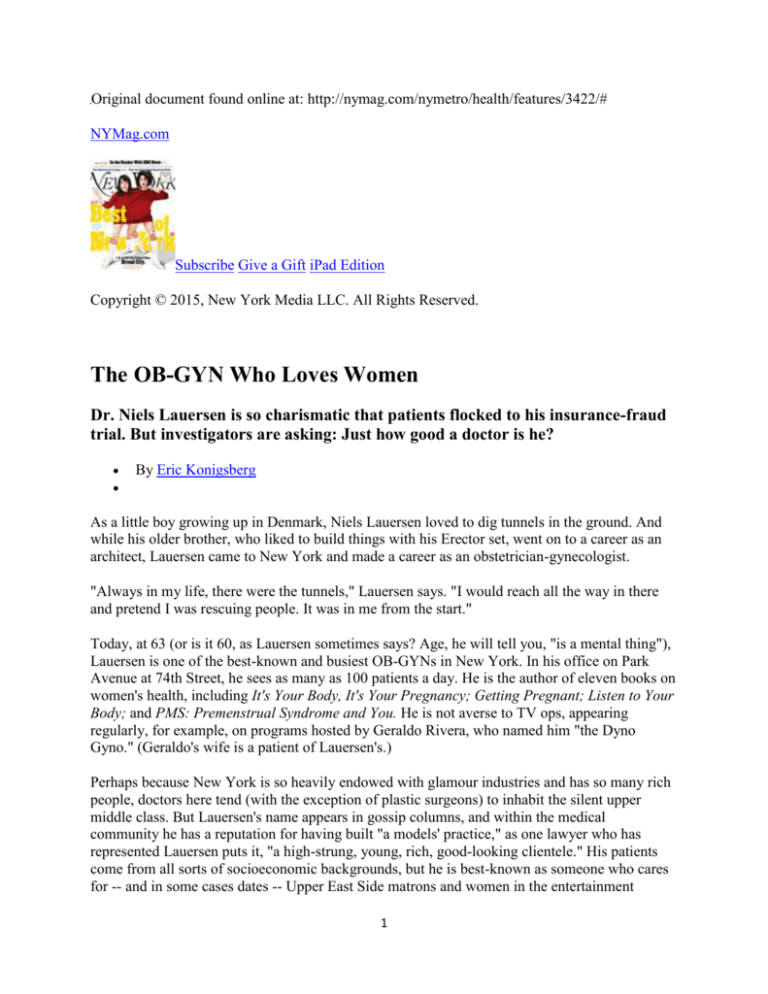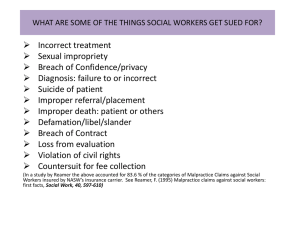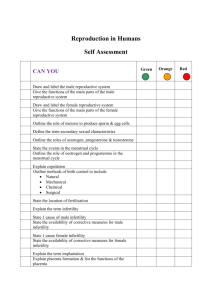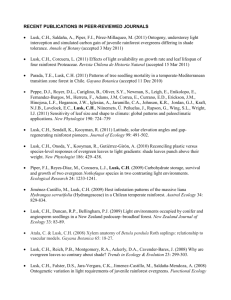
Original document found online at: http://nymag.com/nymetro/health/features/3422/#
NYMag.com
Subscribe Give a Gift iPad Edition
Copyright © 2015, New York Media LLC. All Rights Reserved.
The OB-GYN Who Loves Women
Dr. Niels Lauersen is so charismatic that patients flocked to his insurance-fraud
trial. But investigators are asking: Just how good a doctor is he?
By Eric Konigsberg
As a little boy growing up in Denmark, Niels Lauersen loved to dig tunnels in the ground. And
while his older brother, who liked to build things with his Erector set, went on to a career as an
architect, Lauersen came to New York and made a career as an obstetrician-gynecologist.
"Always in my life, there were the tunnels," Lauersen says. "I would reach all the way in there
and pretend I was rescuing people. It was in me from the start."
Today, at 63 (or is it 60, as Lauersen sometimes says? Age, he will tell you, "is a mental thing"),
Lauersen is one of the best-known and busiest OB-GYNs in New York. In his office on Park
Avenue at 74th Street, he sees as many as 100 patients a day. He is the author of eleven books on
women's health, including It's Your Body, It's Your Pregnancy; Getting Pregnant; Listen to Your
Body; and PMS: Premenstrual Syndrome and You. He is not averse to TV ops, appearing
regularly, for example, on programs hosted by Geraldo Rivera, who named him "the Dyno
Gyno." (Geraldo's wife is a patient of Lauersen's.)
Perhaps because New York is so heavily endowed with glamour industries and has so many rich
people, doctors here tend (with the exception of plastic surgeons) to inhabit the silent upper
middle class. But Lauersen's name appears in gossip columns, and within the medical
community he has a reputation for having built "a models' practice," as one lawyer who has
represented Lauersen puts it, "a high-strung, young, rich, good-looking clientele." His patients
come from all sorts of socioeconomic backgrounds, but he is best-known as someone who cares
for -- and in some cases dates -- Upper East Side matrons and women in the entertainment
1
business. Liv Ullman is a former girlfriend and a patient; Denise Rich -- songwriter, Democratic
Party fund-raiser, and ex-wife of the billionaire fugitive Marc Rich -- was Lauersen's girlfriend
for eight years. Celine Dion has consulted with Dr. Lauersen. When he was in his thirties, he was
married briefly to the heiress Rebekah Harkness, a woman twenty years his senior.
"I like women," Lauersen says. "I've had a few nice girlfriends, a few wonderful people. All
women are beautiful, you know? I've had a few models -- that comes with the territory."
"You connect with a woman when you're getting her pregnant. Maybe I connect better than other
OB-GYNS."
Dating models comes with a career as an OB-GYN?
"I mean, I don't date patients, but a lot of my patients are wonderful and beautiful. Women are
more fascinating than men -- physically and psychologically."
There was a time, back in his residency days, when the sound of Lauersen's clogs hitting the
floor would send the nurses in the gynecology wing into giddy excitement. "They'd tell each
other, 'Here he comes, that handsome Dr. Lauersen,' " says Ronnie Verebay, a receptionist in his
office. "They'd primp and preen." But Lauersen has let his midsection go thick and his ringlets
have lost their spring. They've also lost their blondness -- he seems to have fought nature by
dyeing them a shade of orange reminiscent of Johnny Rotten's.
The past few years have not been easy on Niels Lauersen, seductive though he may still be. A
federal investigation that began in 1997 led to a 23-count indictment, primarily over insurance
fraud. Lauersen's trial, which took place over seven weeks from January to March of this year,
ended with a hung jury, but a retrial is scheduled to start August 9. In question is whether
Lauersen defrauded insurance companies of $5 million over ten years by receiving
reimbursement for infertility treatments (for which the patients were not covered), billing them
as gynecological procedures (for which the patients were).
Throughout his trial, the courtroom was overrun with dozens of women, Lauersen patients who
had come to stand by him in his hour of need. "Once you've known Dr. Lauersen, you could
never let him sit here by himself," said an older patient who didn't want to give her name. "He's a
genius when it comes to women. If there's a part of a woman that's medically known, he's the
expert on it."
"I connect with my patients," Lauersen says. "You connect with a woman when you are getting
her pregnant. Maybe I connect better than other gynecologists."
Perhaps. But while the Feds were investigating his insurance claims, the New York State
Department of Health was conducting its own investigation of Lauersen's care of eight patients.
On February 25, Lauersen was found guilty of "practicing with negligence on more than one
occasion" (most of this having to do with poor record-keeping), placing his license on two years'
probation. And the state has a separate investigation under way involving quality of care that
could have even more dire results.
2
Lauersen has recently faced a string of malpractice cases. In late 1998, two juries in separate
cases handed down awards of $1.8 million and $375,000 over improperly handled deliveries. In
both, it was alleged he used excessive traction, resulting in nerve-root injury to the infant's
brachial plexus (in the shoulders) and partial paralysis of the arm.
One night while the second of these trials was going on, Lauersen had another catastrophic
delivery at Lenox Hill, allegedly fracturing the baby's skull with a forceps; the baby was born in
cardiac arrest, with risk of permanent brain damage. Lauersen's admitting privileges at the
hospital were suspended as a result of this incident, says a Lenox Hill source, and he resigned.
Lauersen is a rainmaker, however, and last year he managed to get a new appointment at St.
Vincents. "Dozens of my important friends" -- including, he says, John Kennedy Jr. -- "wrote
letters" to help him get the appointment.
These are serious times for the Dyno Gyno of Park Avenue, but Lauersen thinks the only threats
to his career are those that can dent his notion of his own decency. "I'm a good person, you
know?" he said when we first met.
Lauersen said this with captivating, wide-eyed sincerity. But his considerable charisma is lost on
many of his fellow doctors, who -- always off the record -- are dismissive of the quality of his
care. Colleagues at hospitals he's left -- he also worked at New York Hospital and Mount Sinai -describe him as "flaky" and "detached." "I thought of him as just a jet-set kind of guy, an
unpredictable doctor," says one. "He was just not the kind of person I would feel comfortable
sending a patient to."
But as evidence of his medical excellence, Lauersen points to his legions of devoted patients.
"Some of them even brought their babies to the trial, and that judge made them leave," Lauersen
observes. "People come to me when they can't get pregnant, and I help them. I'm a fertility guru.
Because what could be better than giving people babies?"
Lauersen's hold on his patients was in evidence from the outset of his federal trial. Women filled
the benches and clogged the marble foyer outside the elevator bank, 30, 40, 50 of them a day.
There were women in the cafeteria and women in the hall. Beautiful women and homely women;
women in serge and women in sweats; women who had a day off from work and women who
had their life off from work. Some brought husbands. Some brought babies. Some brought
pictures of Lauersen holding their babies.
The Danish former model and modeling agent Bonnie Haydon, elegant and well preserved, hit
some kind of perfecta as a patient, an old friend, someone whose husband has been Lauersen's
lawyer, someone who sent her daughters to Lauersen, and someone whose grandchild Lauersen
had delivered.
An Israeli mother of twin 21-month-old boys happened to discover Lauersen on TV after six
gynecologists had misdiagnosed her endometriosis. "He brought me so much joy," she said.
"Such an extraordinary man. I had a C-section and a problem with the anesthetic. He said, 'Just
3
put your head on my shoulder -- it'll be okay.' I saw his face when I delivered, and he was
beaming. Then at two in the morning, he brought me a ham-and-cheese sandwich."
Abbe Aronson, a Greenwich Village mother, told her husband that morning that if Lauersen
should lose his license, she was not having any more children: "It would be unthinkable to have a
kid with another doctor." She spoke of him the way a fan would a rock star. "He's very busy, but
once you're pregnant, you're let into his inner circle." She liked that he made the doctor-patient
relationship "so personal. For example, I went when I was just out of college, and he said, 'It's
time for you to go off the Pill.' I wasn't even married. He said your body has to get ready. A few
years later, he told me, 'Now it's time. Get pregnant while it's easy, and everything else will fall
into place.' "
Paulina, a Russian Jewish mother from Brighton Beach, had had quadruplets the preceding June,
four boys, and after three, she'd run out of names. "So I named the fourth Niels."
At the trial, the women made friends, forming car pools and taking turns baby-sitting. They all
said they had just decided to come, but the truth is that Lauersen's friend and aide de camp Stuart
Matelsky had launched a full-scale phone-athon to drum up courtroom attendance. (Stuart's wife
is another patient who credits Lauersen with saving her life and with enabling her to get pregnant
where other doctors had failed.)
There was something almost reverent in the way the women rose from the benches en masse
when Lauersen came near, walking that pigeon-toed walk in his low-vamped loafers. How they
kept form patiently when he walked by with a box of chocolates and distributed candy right in
their mouths. The proprietary tone one of them took in pointing out what a jalopy of an Audi he
drives now that he's no longer carted around in Denise Rich's limo.
The government's star witness was Dr. Neil Ratner, Lauersen's former anesthesiologist, who
testified to a deliberate office policy of falsifying insurance forms. The prosecution knew Ratner
would be a shaky witness, so the attorneys started the questioning by having him admit to
dodging the draft, to being unable to get into an American med school, to dealing drugs, and to
being "pretty stoned a lot of the time I was giving anesthesia," once accidentally injecting
himself with a paralyzing agent on the job. But to Lauersen, Ratner was like a patient, a person
he could make well. "I took Ratner when nobody else would," he says. "I made him a good
person."
"He just tried to do too much. He's a brilliant, decent guy, and he couldn't say no," says a
colleague.
Lauersen estimates that 10 percent of his practice comes from infertility cases. The prosecution
brought forth five such patients in attempting to prove a pattern of insurance fraud. In addition,
prosecutors charged Lauersen with mail fraud and witness tampering. The alleged tampering
involved telling a patient who'd phoned to say she'd been subpoenaed to "just tell the truth,"
according to her testimony, after which Lauersen informed her of a prior diagnosis that was news
to her. She said he added that she might remember her records were destroyed in an office flood
(she didn't remember).
4
Lauersen's defense claimed he could treat infertility at no cost to the insurer, by way of a dual
procedure: Gynecological work -- removing a cyst from a woman's uterus, say -- made it
possible to administer fertility treatments at the same time. This would make for no extra session,
as she was already on the table, and no extra fee. The government alleged the cysts were merely
a front, that they needn't have been removed. Certainly there were some curious, if apparently
inconclusive, patterns in Lauersen's practice: the abnormally high volume of cyst removals and
dilation-and-curettage cases (an increasingly outdated procedure done to test for cancer in the
cervix or uterus) he billed for that might have been a front for fertility treatments. For example,
Lauersen billed Blue Cross-Blue Shield for 356 cyst removals over a seven-year period. His
closest competitor had only 41.
The patients who testified against Lauersen all seemed to be there against their will. When Benay
DiGia, whose infertility treatments the government tried to show had been illegally reimbursed,
was asked what Lauersen specializes in, she answered, "Kindness, compassion."
Later, during a recess, Lauersen put his arm around one of his lawyers, a 28-year-old Paul, Weiss
associate named Danya Perry. "When am I going to get you pregnant?" Lauersen said. Then he
nodded toward another man at the defense table. "Your eggs, his sperm."
"Jesus, Niels," she said.
Late most nights, Lauersen drops in on his friend Peter Lusk, a hedge-fund manager who lives
just off Fifth Avenue. One such night, Lusk, a strapping man with a white beard, opened the door
in pajamas, an undershirt, and bare feet. Lusk and his fiancée, Jeanne-Marie Fribourg, have
endowed their place with a classic second- or third-marriage feel, with large public-entertaining
rooms and beautiful things (Fortuny upholsteries, Scalamandré draperies, Picassos, Chagalls,
Matisses, Dufys) but little to signify its inhabitants, save Fribourg's old modeling photographs,
Steiff animals in their bedroom, and a nude photo of her teenage stepdaughter.
"When I met Niels, I was living in Boston and married to a prominent Brahmin, a really
prominent Brahmin," Fribourg said. "How many women do you know whose gynecologist
offers, when she gets divorced and moves to New York, to loan her money, to vouch for her to a
co-op board, to help her find work? Then, when I came down with breast cancer, he got me in
with the right doctor."
Lusk helped pay for Lauersen's legal-defense team, headed at the time by Ted Wells, a hot-rod
litigator who recently moved from a firm in New Jersey to take a partnership at Paul, Weiss. "He
really has the ability to talk to the jurors in their language," Lusk said.
Fribourg set out crackers and a Stilton, and Lusk went on. "This is a case that started with the
insurance companies, and they and the government are basically on a witch hunt."
Lauersen said, "I just, you know. We'll see. But I can't . . . know why she is doing this to me. I
don't know if Mary Jo White" -- the U.S. Attorney for the Southern District of New York -- "has
children. Maybe she had a problem with it, you know? Maybe she's just too ugly."
5
"This assistant U.S. Attorney who's prosecuting the case, this Christine Chung, she really seems
to have something personal against Niels," Lusk said. "Do you see the way she looks at him?"
He narrowed his eyes.
"She looks like a snake," Lauersen said. "She just, you know, like this." He narrowed his eyes,
too, then thrust his neck forward.
"Well, I'll tell you, I have watched her through this trial and I have not been impressed," Lusk
said. "She's no Gerry Spence. She's not even the Korean Gerry Spence."
Fribourg lifted her glass. "To Niels, the kindest person I think I know. Together we will get
through this."
"Hey," Lauersen said. "I had Foxy Brown in my office today."
lauersen came to new york hospital to begin a surgery residency at Cornell Medical Center in
1967. Dr. Fritz Fuchs, the new chairman of OB-GYN, was from the University of Copenhagen
and had brought Lauersen over. "My life wasn't your typical resident's life," Lauersen says. "I
made a lot of European friends, non-doctors. Nightclubs, parties, you know."
In 1973, at 36 and with his grad-student days not far behind him, Lauersen married 58-year-old
Rebekah Harkness, widow to William Hale Harkness, of the Harkness philanthropic dynasty. "I
was set up with her daughter, Terry," Lauersen says. "But that didn't work out. There wasn't any
chemistry."
Harkness had been a sponsor of the Joffrey Ballet and later started her own ballet company. Over
the course of her life, she married four times, battled drug and alcohol dependencies, kept a
penthouse in the Westbury Hotel, had Salvador Dalí paint a portrait of one of her daughters, dyed
the chocolate mousse she served at parties blue because she didn't care for the color brown, and
by the end expended the bulk of her estimated $75 million (in those days, a lot of money). "She
was under so much pressure -- friends, staff, lawyers, choreographers, her daughters, everyone
pulling her different ways. She thought I could help her. I thought I could help her."
They made a home at the Harkness estate at Sneden's Landing, on the Hudson River. "It had
ghosts," Lauersen says. It also had 30-foot ceilings and a fireplace that had belonged to William
Randolph Hearst. Harkness always said, "Well, it's not home, but it's much." Lauersen's friend
Emily Altman, who visited with her husband, remembers five servants' watching the two couples
eat dinner. "You rang a bell when you wanted the salt. The whole thing was bizarre -- young,
naïve Niels and this grande dame society matron. She had him wear a black-and-shocking-pink
cut-velvet tuxedo jacket."
"All in all, a few years maybe, I don't remember how long we were married," Lauersen says.
(They divorced in 1976.) "But I helped convince her to give the Harkness Pavilion to New York
Hospital." Actually, it was begun in 1966, before he met Harkness.
6
He has never remarried. "Niels -- he's just not a one-woman kind of man," says the artist Lale
Djuric, a friend. "Do you know how many women Niels has shown up with at parties over the
years? Guess. No, don't guess -- I tell you. Hundreds. One thousand. Something like that."
Lauersen says he might like to have children some day. But Eileen Stukane, his co-author on
several books, says, "He finds birthing babies very gratifying, but I'm not sure he would like the
process of raising one. He likes handing a woman a healthy baby and moving on."
Lauersen and Denise Rich stayed together for eight years. A friend of theirs says Rich cooled on
the relationship when the legal problems surfaced. "She had been humiliated already by her
husband's financial scandal, and she couldn't take any more of this."
Lauersen says it was his compassion for "beautiful women" that drew him to elements of
gynecology that figure prominently in his books: "If a beautiful woman came into the emergency
room with endometriosis, everyone assumed she had VD. My colleagues put women down."
To Niels Lauersen, just as to warren Beatty's hairdresser character in Shampoo, women are both
vocation and avocation. Just as when Beatty makes a house call to Julie Christie she greets him
in a robe and has him blow-dry her hair in the bathroom, Lauersen's work involves an intimacy
few men ever see. His conversation skills aren't immediately apparent, what with the heavy
accent, a big case of the mumbles, and a nonlinear quality to most of his utterances.
("Sometimes, I don't think he wants to be understood at all," one former girlfriend says. "It's like
a shield, his way of maintaining a little private space.") Instead, Lauersen gets himself into his
patients' personal space. He phones in the middle of the night to see if they're all right, lets them
come see him as often as they like (often, they say, without billing). In his world, the OB-GYN is
a chivalrous hero. And in his world, it takes three to make a baby. "With a couple, you have to
find out what the problem is between them," he says. "I let the woman complain, just listen. I
calm the husband down, make sure he helps her. I form two different bonds with each of them.
Then all of us, we make magic."
Of his troubles, Lauersen says, "I guess that's the price for being where I am. but you know? I'm
busier than ever."
Actually, in one of the most spectacular cases against Lauersen, a patient accused him of trying
to impregnate her literally. In 1994, a former girlfriend named Ann Klendshoj sued Lauersen for
malpractice, claiming he had coerced her into two pregnancies, "to act as his sperm depository in
order to see whether Lauersen could father a child." He had lent her money and rented her an
apartment in Trump Tower. "This woman, she wanted to marry me," Lauersen says. "She knew I
was with Denise, and she got angry." The case was eventually dropped.
Then there was Kimberly Alvarez, another patient. She, too, sued Lauersen, for a rape she said
took place in the Park Avenue apartment next to his that he kept for patients from out of town.
Lauersen settled last September, for a reported $110,000. "I thought it was a copycat thing," he
says. "I was so stupid, stupid, stupid, for letting her stay in that apartment. I've got to be more
careful; there are so many crazies, you know? It's just one of those things, because I'm nice to
women, nice to people. Like I would need to go out and rape someone? There are women out
there. I could go and get a date. I mean, I had a date. I was with Denise that night. This woman
7
wasn't like the Klendshoj case -- that was a beautiful woman. Usually, that happens to sports
people. Not so often with a gynecologist."
The circumstances in the cases are murky, and he denies the charges in both. The second patient
had a history of multiple-personality disorder, and though the Manhattan district attorney's office
investigated the case, no criminal charges were brought.
Emily Altman has a fairly benign explanation for all of this. "Women fall in love with him, and it
can be a curse," she says. "I think sometimes he promises stuff he shouldn't have in the heat of
the moment. It's a boyish thing to do. Now he's 63, and he's still doing it."
The malpractice suits are more troubling. Of all medical specialties, OB-GYNs and
neurosurgeons run the highest risk of malpractice claims. That said, Lauersen's tally is difficult
to ignore: An examination of court records shows at least 26 such claims. By comparison, the
average OB-GYN is sued for malpractice four times over the course of a career, according to a
1999 Medical Economics Research Services survey. (It should be noted that this was a selfselective study.)
Still to come is a suit accusing Lauersen of performing so many unnecessary surgeries on a
patient's uterus that it had to be removed, as well as a new "traumatic forceps delivery" charge,
and others. (Juries have ruled in Lauersen's favor in a number of malpractice cases.)
"He had half a dozen cases going on against him when I tried my case," says Alvin Broome, a
lawyer who in 1998 won a malpractice judgment against Lauersen (over a delivery). "He would
have to have been a magician not to, given the number of babies he delivers in a year, in my
opinion. I think this guy was stressed." A surgery-department chair at a hospital where Lauersen
worked thinks this was the root of his problems: "He just tried to do too much. He's a brilliant,
decent guy, and he couldn't say no. As my grandmother used to say, 'If he were a woman, he'd be
pregnant all the time.' "
Lauersen has insurance in an assigned-risk pool with the Medical Malpractice Insurance
Association, meaning no single insurance company is alone responsible for him. The typical OBGYN in New York might spend around $80,000 to $100,000 a year on health insurance. With
MMIA's rates and his record, Lauersen could be paying twice that.
Dr. Warner Nash, an OB-GYN semi-retired from Lenox Hill, has scrubbed with Lauersen over
the past fifteen years and is generally supportive of his friend, though he thinks his ego hasn't
helped. "He's very dedicated to his patients, but I don't always agree with his medical decisions
and his treatments. He's off on his own, doing procedures others do in hospitals -- laparoscopies,
cystectomies. Not many OB-GYNs have an in-house anesthesiologist. He likes that it's less
supervised, that he doesn't have to have someone looking over his neck."
Indeed, Lauersen is dismissive of the malpractice suits. "I guess that's the price of being where I
am," he says. "But you know what? I'm busier than ever. I'm still delivering babies."
8
Of the forceps case that led to his ouster from Lenox Hill -- and also got him taken off Oxford
Health Plan's list of approved providers -- Lauersen says, "It was a nonevent that shouldn't have
happened. They had a new head of the department at the hospital" -- Dr. Michael Divon -- "and
he was resentful of all the business I brought in. The interns didn't come down to help me. The
hospital had been refusing to let the residents help me for a long time. I deliver one baby a day. I
know how to do this." (The other version of this, says a colleague, is that Lauersen refused to
work with residents. Dr. Divon didn't return calls to his office.)
Lauersen says the two previous resignations -- from New York Hospital in 1979 and Mount
Sinai in 1984 -- were his choice. Few doctors will speak openly about Lauersen's record. "I'll just
say that all the things occurred after I left," Dr. Hugh Barber, the retired head of OB-GYN at
Lenox Hill, says. "I had a very strict way of supervising all the attendings. With me, he knew he
had to stay in line."
Whatever his problems, Lauersen continues to have something hospitals want. "Unfortunately,
medicine's changed so much that cost control is the only issue," says an OB-GYN at New York
Hospital, a former colleague of Lauersen's. "Lauersen has these malpractice suits; it's a pattern.
But a hospital will take anyone if he can bring in a lot of patients, and Lauersen has a following."
Deliberations in the fraud case were held up half a day when a woman who had been in the
gallery approached three jurors outside the courthouse and said, "He's a good doctor." She turned
out to be one Vivian Fan, of Bayside, Queens, a patient of Lauersen's who didn't seem to realize
she'd done anything wrong when she showed up the next day; the judge, William Pauley,
banished her for the duration of the trial. (Though his tone was less severe than with the patient
who blew Lauersen a kiss; he instructed her to stand up, declaring that he wasn't sure where she'd
learned such behavior -- acting school, perhaps -- but it wasn't tolerated in his courtroom.)
On the fourth day without a verdict, the jury asked to review prosecution evidence, and Lauersen
seemed doomed.
"Oh, my God, the jurors, they've gone backwards," he said as he headed toward a conference
room for lunch with his lawyers. His hands trembled. "I would lose my practice. I could go to
jail. It's not fair to all these women."
Lale Djuric entered and made himself a plate of food. "Is like a chess match," he said. "Twelve
people, twelve minds." Lauersen offered him some chocolates.
The lawyers discussed Christine Chung. Her spirits seemed very high today. Still in her thirties,
she has the typical young-and-hungry profile of a government crime-fighter. She has already
tried several big cases, most notably a prosecution of Don King.
"Don King, I know him," Djuric said. "I would love to see Snake against him."
Lauersen perked up. "You know Don King?"
Ted Wells rolled his eyes.
9
"I should have had Geraldo testify," Lauersen said. "Liv Ullman said she would do it, too."
Silence.
Lauersen said, "One of my patients is an astrologer. I'll ask her to do the voodoo with the chicken
blood." He laughed.
Wells stared at his can of soda. "I've been waking up every night at 3 a.m.," he said. "You ever
watch the Weather Channel for three hours straight?"
Lauersen said, "All the women who testified, they all said I'm a good person."
There are currently thirteen states in America with some sort of mandate that insurance
companies cover infertility. In New York, such legislation may be close to resolution by year's
end. In 1998, the United States Supreme Court ruled that reproduction constitutes a "major life
activity"; a woman who is medically unable to reproduce falls under coverage by the Americans
With Disabilities Act.
Infertility affects one out of every six couples. But, says Pamela Madsen, director of the
American Infertility Association, only 20 percent of them go on to seek treatment, "because
access is so dear." High-tech therapies start at $5,000 to $12,000 per treatment cycle. A study
published in Fertility and Sterility found that in Massachusetts, which promises comprehensive
coverage, insurance companies have had to pass on a monthly rate hike of only $1.71 on
average.
There are more than 30 in vitro-fertilization programs around New York. Several cutting-edge
infertility centers, such as Cornell's, NYU's, and St. Barnabas in New Jersey, have conception
rates among the highest in the world. By comparison, says a leading advocate of women's healthcare issues, "Niels doesn't have the resources to really compete. He has a very middle-of-thepack operation. He's not a star in the infertility community. He takes people who can't get in
elsewhere. His business has some high-profile patients, but that's via his high-profile girlfriends.
I would send a patient to him, but that would depend on the patient."
Although his defense hinges on the line that Lauersen did not perform infertility treatments at the
expense of unwitting insurance companies, there's a steady undercurrent to it that says, So what if
he did? "The government's calling me Robin Hood, robbing from insurers and giving to my
patients," Lauersen says, smiling at the characterization. "Insurance companies should be paying
for these women."
Wells says, "Even if he did what they say he did, why is it criminal? They shouldn't be putting a
man away for that."
In October, the Archives of Internal Medicine published a poll of 169 doctors, in which 57
percent said they would deceive an insurer in order to help patients obtain coverage. But is
Lauersen's case that simple? Falsely reporting a surgery would constitute more than a bending of
the rules.
10
"If he did what the government was saying, it's very unusual," Warner Nash says. "But look:
Insurance companies have pushed us into the garbage can. I always thought doctors were gods.
We loved caring for our patients. Now we are forced to nickel-and-dime with everyone."
Still, if Lauersen did it, why? He has patients who could have paid for their treatments. And he
sees so many patients -- rich and poor -- without charging. Nobody thinks he needed the money.
"He has a great sense of the importance of what he's doing," Nash says.
Lauersen's insurance-fraud trial ended on a Monday, and by noon Tuesday he was back to a full
schedule. He starts his typical day at the office between 10 and 11 a.m., usually beginning with
surgery, then holding office hours, and then going eventually to Mr. Chow's or Elaine's or an
appearance at a dinner party he feels bad for having held up. "I like also to go to after-hours
clubs," he says. "And I'm a member of Doubles, the Metropolitan Club. Union Club, well, no,
but I'm like a member. I have friends. I can go there anytime. I take the doctors to all these clubs.
Most doctors don't know these places. So it's a cultural experience for them that improves their
lives."
Lauersen's office is a warrenlike operation behind the lobby of a Park Avenue co-op. In the
entryway, there's a bronze plaque of a pregnant woman holding one breast and a drawing of a
shaggy nude couple gazing soulfully at each other -- it looks very early-edition Joy of Sex. One
of his consultation rooms has a framed certificate from the International Star Registry in
Switzerland declaring him a member, "redesignated" by his star number, and a plaque that says
doctor lauersen at you're sic cervix. The men's room is full of porno magazines. "So the men -you know, jerking off," he says. "The nurses buy them. Some of the men can't do it without their
wives in there. One guy, he needed to lie down. Everyone's little sex things -- so fascinating, so
funny."
Even with his hours, 100 patients are a lot to squeeze into a day, and by 6 p.m., the office is
standing-room-only, with patients getting their blood pressure taken in the hallways. A few
weeks ago, as he moved through his appointments, he emerged from an examining room to the
expectant stares of a dozen patients. Without breaking stride, Lauersen groped at their hands, one
quick squeeze after another, like a candidate reaching over police lines. "You'll get pregnant,
you'll get pregnant, you'll get pregnant," he said to each.
Lauersen disappeared for twenty minutes. When he came back out, he said he'd seen "four or
five" patients. "I was just with a woman who says I got her pregnant just from vitamins and
reading my book," he said. (He is keen on first instructing a woman to eat healthy, to sleep on
her left side after sex, to have sex at certain times of the day.) Twenty minutes later, Lauersen
was back in the hall to say he'd taken care of another "five or six" women, and a young couple
whom he'd left with the advice: "Work during the week, sex on weekends."
Lauersen took a break at his desk for some chocolates he'd been given by a patient, and
mentioned that he'd gotten a call from one of the jurors. "She said she thinks she's found a new
doctor. She's not like" -- he referred to another juror. "That one was such a bitch, you know? The
11
nice one wants to come in to see me this weekend." She just called him out of the blue? "Maybe
she called my friend Stuart. He knows some of the jurors."
Stuart, in truth, had been tracking down jurors to see if they had advice for the retrial.
Nonetheless, the juror did ask to meet Lauersen -- she says she "felt strongly about acquittal and
wanted to tell him that" -- and in fact appeared taken with his presence. "I got the impression that
he was a very childlike and a nice person, paying for a staffer's lawyer, co-signing a mortgage for
one."
"I think she was smitten," Matelsky explained.
"She liked me. She thinks I'm a good person," Lauersen said.Lauersen prepared to go down to St.
Vincents for his midnight rounds, with a stop on the tanning salon at the way. "It has not been a
good year," he said as he got into his car. "I don't know why people keep doing this to me.
Maybe they don't realize that I'm a good person."
12









